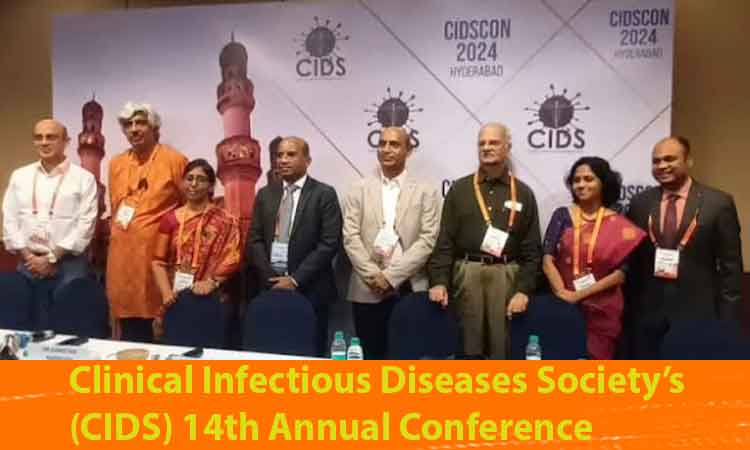365Telugu.com online news,Hyderabad,16th August 2024: The Clinical Infectious Diseases Society’s (CIDS) 14th Annual Conference, CIDSCON 2024, commenced on 16th August at the Hyderabad International Convention Centre. This conference serves as a dynamic platform for fostering discussions on the latest advancements and challenges in infectious disease management, with a focus on India. The highlights of this year’s conference address two critical challenges threatening public health in India: Antimicrobial Resistance (AMR) and Emerging Infections.
Antimicrobial Resistance: A Silent Pandemic
AMR continues to be a silent pandemic with alarming consequences, particularly in India, which bears one of the highest burdens of drug-resistant infections (DRIs) worldwide. Currently, about 1 million AMR-associated deaths occur in India, contributing to an estimated 5 million deaths globally each year. Projections indicate that by 2050, AMR could result in 10 million deaths annually, surpassing cancer-associated deaths.

The rise of AMR, driven by the misuse and overuse of antibiotics, is rendering many medical advances ineffective. In India, Gram-negative bacteria such as Klebsiella species, Escherichia coli, and Acinetobacter species are the primary culprits. Gut organisms like E. coli and Klebsiella harbor a common resistance mechanism called Extended Spectrum Beta-lactamases (ESBL) in 70-80% of cases, with rapidly spreading carbapenem resistance leading to mortality rates as high as 40%.
Actionable Efforts Promoted by CIDS to Tackle AMR:
- Stewardship Programs: CIDS promotes and helps implement antimicrobial stewardship programs in healthcare facilities across India. These programs aim to optimize the use of antibiotics, ensuring they are used only when necessary and appropriate.
- Promoting Research and Development: Research to develop diagnostics and new antibiotics is urgently needed. CIDS calls for increased funding and collaboration between the public and private sectors to drive innovation in this field.
- Surveillance and Data Sharing: Enhanced surveillance of AMR patterns is essential. CIDS advocates for the development of an AMR surveillance network to supplement and strengthen national surveillance, enabling timely data sharing and informed decision-making.
- Infection Prevention and Control (IPC): Strengthening IPC measures in hospitals and communities is crucial. This includes hand hygiene, sterilization protocols, and vaccination programs to prevent infections and reduce antibiotic use.
- Public Awareness Campaigns: Educating the public about the dangers of antibiotic misuse and the importance of adhering to prescribed treatments is vital. CIDS continues to improve public awareness to address this issue.
Emerging Infections in India:
The emergence of new infections in India is a growing concern. In 2024, more than 150 cases of Chandipura virus encephalitis were reported in western India, new cases of Nipah virus infection emerged in Kerala, and over 20 cases of primary amoebic encephalitis were documented in Kerala and West Bengal. These incidents highlight the dynamic nature of infectious diseases and the urgent need for vigilance and preparedness.
Actionable Efforts and Link to Climate Change:
- Enhanced Surveillance and Rapid Response: CIDS advocates for the expansion of surveillance networks to detect and respond to emerging infections promptly. Rapid identification and containment are essential to prevent widespread outbreaks.
- Interdisciplinary Collaboration: Addressing emerging infections requires collaboration across multiple disciplines, including infectious disease specialists, epidemiologists, veterinarians, environmental scientists, and public health officials. CIDS supports the formation of interdisciplinary collaborations to tackle these challenges.
- Research on Climate Change: There is a growing body of evidence linking climate change to the emergence and spread of infectious diseases. CIDS calls for increased research to better understand these links and develop strategies to mitigate their impact.
- Strengthening Healthcare Infrastructure: The ability to respond to emerging infections relies heavily on the strength of the healthcare system. CIDS urges the government to invest in healthcare infrastructure, particularly in rural and underserved areas, to ensure that the country is equipped to handle new threats.
- Public Education and Community Engagement: Raising awareness about emerging infections and their potential links to climate change is crucial. CIDS is committed to engaging communities through education and outreach programs to promote preventive measures and early reporting of symptoms.

As India faces these significant public health challenges, the Clinical Infectious Diseases Society remains dedicated to leading efforts in research, education, and advocacy to protect the health and well-being of the nation.

